Two titans of the NFL’s coaching ranks could not be more different at their base. Pete Carroll—the Seattle Seahawks’ skipper, exudes self-confidence one would expect when encountering a youth from San Francisco—with a smile that hides the 63 years of life around the most world’s most-physical game. On the other sideline, a seasoned veteran of eight Super Bowls will stand above the rest of his fellow coaches, epitomizing the grit of a someone raised in the shadow of a military man born in Tennessee and maturing in Annapolis, Maryland. Bill Belichick has been around the game of football since he accompanied his father, an assistant coach, to United States Naval Academy football practices in the 1960’s.
A pairing driven apart by personality has been united by the sport they have played and coached. The two coaches’ careers mirror each other’s from sanctions and disgrace to winning trends. Each man has made himself a household name both positively and negatively.
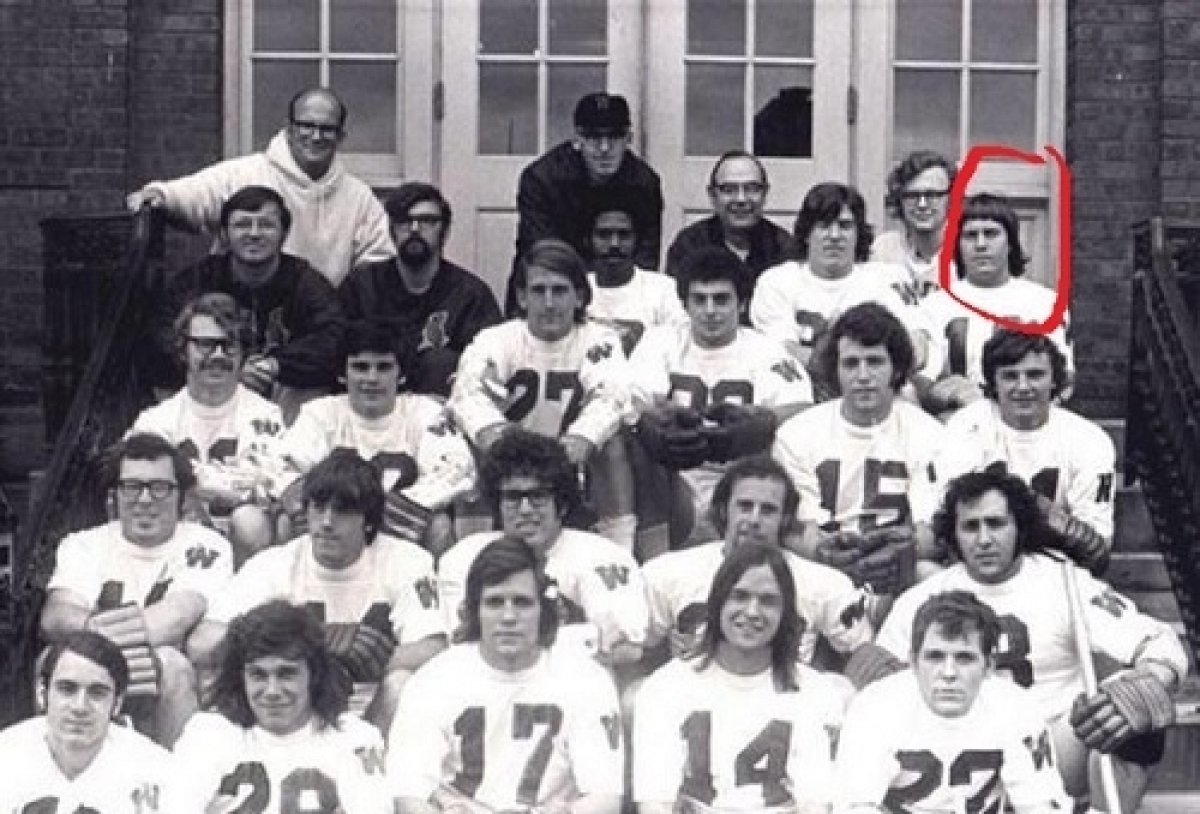
Courtesy of the Boston Herald: Belichick during his Wesleyan days.
Separated by just one year in age, Belichick and Carroll grew up in the early years of football’s rise to the top of the American sporting spectrum in starkly separate areas. Carroll spent two years as starting free safety at the University of the Pacific, earning all-conference honors in both 1971 and 1972 while gaining a degree in business administration. Belichick played tight end at the Wesleyan and earned his degree in economics in 1975.
Both men moved on from their alma mater’s in the late-half of the 1970’s, Carroll to Arkansas to serve as a graduate assistant under Lou Holtz, and Belichick to the NFL as an assistant coach of the Baltimore Colts. Yet neither would find their true calling for over a decade. Carroll jumped around as a graduate assistant serving at Iowa Sate University, and Ohio State University before joining Monte Kiffin’s staff at North Carolina State as a defensive coordinator in 1981. Carroll would wrap up his first stint as a college coach as the offensive coordinator of his alama mater until the conclusion of the 1983 season.
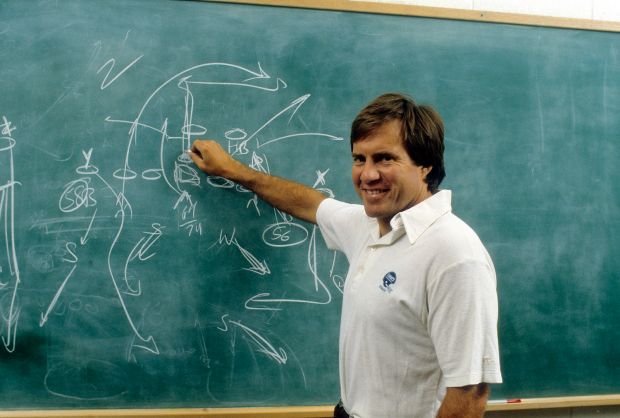
Courtesy of Fox Sports; Belichick learned from the great Bill Parcells in New York.
During this time, Belichick bounced about as an assistant for the Denver Broncos and Detroit Lions until landing a semi-permanent gig with the New York Giants. Starting in 1979—first as a defensive assistant under Bill Parcells then as the team’s defensive coordinator—Belichick would go on to win his first two Super Bowls.
Following his 12 years as a Giants assistant, Belichick would be hired as the Cleveland Browns head coach in 1991, a position he held until 1995 when the team relocated to Baltimore.
Belichick’s counterpart for Super Bowl XLIX did not spend this decade idly. Carroll would join the defensive staff of the Buffalo Bills in 1984, the team Belichick’s Giants would defeat in the Super Bowl in 1990. Carroll spent just one season in Buffalo before serving as the defensive backs coach of the Minnesota Vikings from 1985-1989. Following a successful tenure as an assistant, Carroll was hired as the defensive coordinator of the New York Jets in 1990, a position he would hold until 1993.
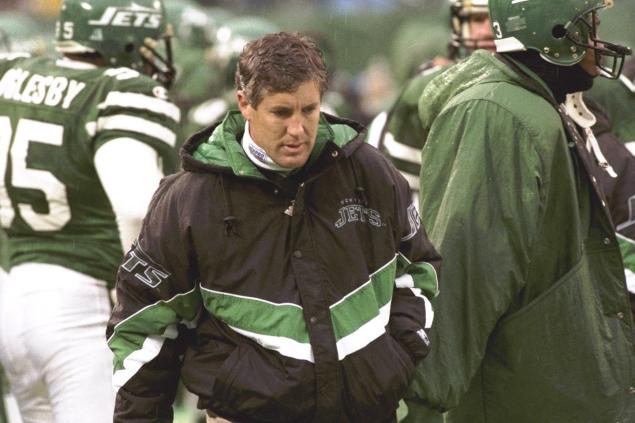
Courtesy of ESPN: Carroll’s first stint as a NFL head coach didn’t go too swimmingly.
After the 1993 season, Carroll took over as the head coach of the Jets, a position he would hold for only one year as his team struggled to a record of 6-10. This was just a minor setback for Carroll, who served for two years as the defensive coordinator of the San Francisco 49ers before being named as the head coach of the New England Patriots for the 1997 season.
While Carroll would lead the Patriots to a division title in 1997, he was fired after three seasons. Here again, we see the two souls merge.
The New England firing was a wakeup call for Carroll, who took a year off from coaching in 2000 before returning to the collegiate ranks and his roots on the West coast. In December of 2000, the USC Trojans made the best hire in the history of their storied football program selecting a failed-NFL skipper to head Trojan football. Carroll would go on to accrue 97 wins and just 19 losses as a coach of the Trojans, a mark that now stands at 83-19 due to vacated wins.
Boasting a career-college resume defined by two AP National titles (one vacated) and a 2005 victory in the BCS Championship game over Oklahoma, Carroll led USC to six BCS bowl victories and had 53 players drafted, 14 of which were in the first round.
Unfortunately for Carroll, and more specifically the University of Southern California, Carroll’s policies as head coach and a recruiter led to more trouble than was worth as the Trojan’s skipper.
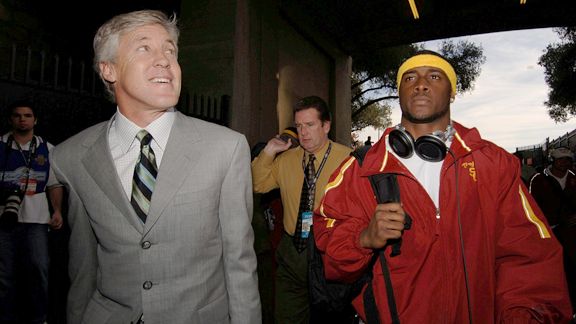
Courtesy of ESPN: Carroll left USC with a dark cloud hanging over the program.
In June of 2010, the NCAA announced sanctions against Carroll’s Trojans, including a two-year bowl ban, the dismissal of 30 football scholarships, and the forfeiture of some wins from the school’s championship season of 2004-2005, in addition to all wins from the school’s undefeated 2005-2006 season. The citations levied sprung from the allegations that the school’s star running back, Reggie Bush, had received improper and excessive benefits while being recruited and while playing for USC. Carroll left the school in the wake of these allegations, claiming he had no knowledge of the event.
While Pete Carroll was reaching fame and fortune at the collegiate level, Belichick’s early-success as the coach of the New England Patriots surpassed even Carroll’s dominance on the gridiron. After serving as an assistant coach on the Patriots’ team that lost to the Green Bay Packers in Super Bowl XXXI, Belichick returned to his safe spot under the wing of Bill Parcells, joining the New York Jets as an assistant form 1997-1999.
Patriots’ owner Robert Kraft would place the keys to the franchise in the hands of a man from the Parcells’ school of thought, giving Belichick complete control over his franchise as far as football operations were concerned early in 2000.
This was the same year as Belichick’s lone losing season as the Patriots’ skipper, and also the only season under his tenure under which Tom Brady did not start a single game.
Belichick’s early successes are well documented. A championship win over the St. Louis Rams in 2001 was followed by back to back Super Bowl titles in 2003 and 2004 over the Carolina Panthers and Philadelphia Eagles respectively. Belichick returned his team to glory in 2007, boasting the league’s first perfect 16-0 regular season record, before his Patriots lost to the New York Giants in Super Bowl XLII. However, much like his counterpart found out at USC, with great victory comes great scrutiny.

Courtesy of the NY Times: To some, “Spygate” has ruined Belichick’s legacy.
The incident since-deemed “Spy-gate” occurred in September of 2007 as a Patriots’ staffer filmed Jets’ defensive-signals from a position on the field leading the Jets’ to file a formal complaint with the league after the game. Though the outcome of this event was far from the debacle surrounding Carroll’s virtual-expulsion from USC, this black-mark will forever be synonymous with Belichick’s legacy as a coach. Commisioner Roger Goodell reacted swiftly and strongly to the allegations fining Belichick a league-record $500,000, the Patriots $250,000 and trashed the team’s 2008 first round pick.
Fortunately for Belichick, the good parts of his resume far surpassed the negative, and the Patriots’ coach was able to keep his job. In his 15 seasons as Patriots’ head coach, Belichick has won 12 division titles, made 12 playoff appearances, reached eight AFC Championship games, six Super Bowls, and won three Lombardi Trophy’s.
Belichick’s professional statistics are unsurpassed by any coach before him, yet the man that will stand across from him during Super Bowl XLIX may have a better chance than any to replicate his replacement’s success. Carroll was hired as the head coach of the Seahawks after the 2010 season, and has since brought about four playoff appearances in five years for Seattle, including the team’s 43-8 rout over the Denver Broncos in Super Bowl XLVIII.
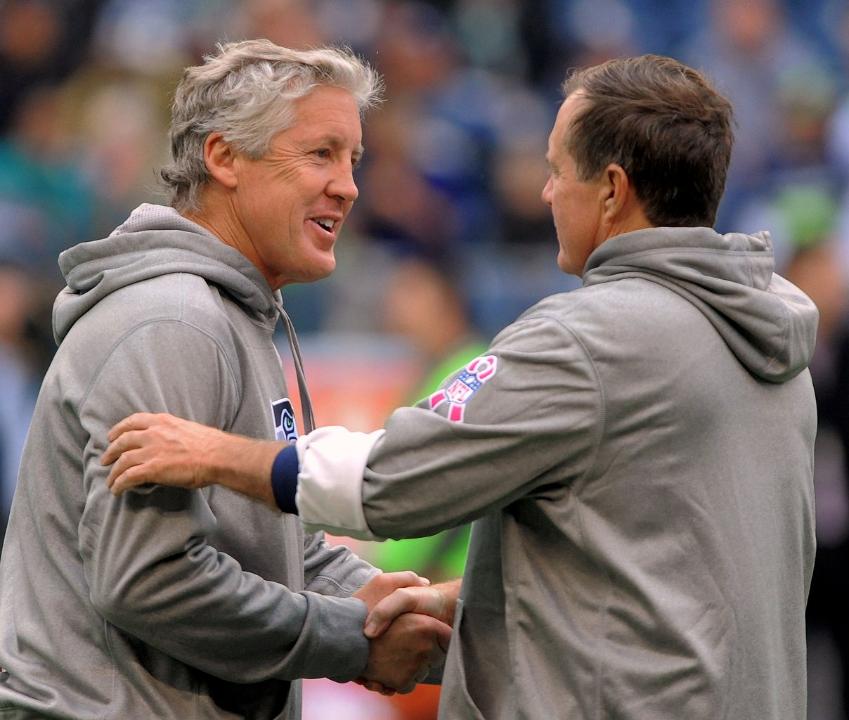
Courtesy of ESPN: The obstacles these two have overcome brings them to the pinnacle of their careers.
Set to be locked in battle on the field in Super Bowl XLIX, Carroll and Belichick’s sagas are forever entwined off of it. Two coaching legends had their career’s marred by scandal only to return to the top level in their field. Both men grew up around the game, played collegiately, and now lead the best of the best on Sundays. Furthermore, both coaches have won at the highest level, Carroll entering his second Super Bowl and Belichick set to take part in his eighth. The two are opposite only in personality and style. Carroll dresses like a cool 1990’s Dad, and Belichick’s in his invention of the sleeveless-hoodie. These two legends of the game are both in their sixties and are faced with the reality that this could be their last dance.
Which guru will make the most of it?